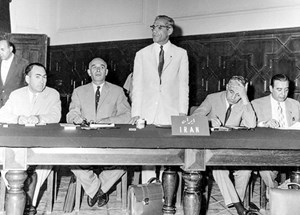OPEC: Unification of the world’s petroleum producers
In the 1960s, Arab nations, which relied heavily on oil revenue, were being frustrated by oil price cuts made by Western oil companies. Another problem was the import caps imposed by the U.S. government, which also depressed prices. In August 1960, Western oil majors slashed prices once again, without consulting the exporting countries. In September, representatives from Saudi Arabia, Venezuela, Kuwait and Iran met in Baghdad with Iraqi officials. These five countries accounted for 80% of the world's crude exports and, on Sept. 14, they formed the Organization of Petroleum Exporting Countries (OPEC). The organization was formed to defend oil prices; however, in its initial years, OPEC had little influence, and was virtually ignored by the U.S. government.

OPEC’s emergence occurred during a time of major change in the international economic and political landscape, as many former colonies gained independence, formed new countries and were admitted to the United Nations. In addition, the process of host countries nationalizing oil assets held by foreign oil companies was getting underway. The international oil market, at that time, was dominated by multinational companies. Thus, the time was optimum for OPEC to develop its collective vision and set up objectives. OPEC established its Secretariat in Geneva and adopted a “Declaratory Statement of Petroleum Policy in Member Countries” in 1968. This emphasized the “inalienable right of all countries to exercise permanent sovereignty over their natural resources in the interest of their national development.”
The five founding members were later joined by additional members, including Qatar, Indonesia, Libya, United Arab Emirates and Algeria, for a total of 10 by 1969.
Since then, Nigeria, Ecuador, Angola and Gabon have joined, and OPEC moved its headquarters to Vienna, Austria, in 1965. OPEC's objective remains to coordinate and unify petroleum policies among member countries, “in order to secure fair and stable prices for petroleum producers; an efficient, economic and regular supply of petroleum to consuming nations; and a fair return on capital to those investing in the industry.” ![]()
- Applying ultra-deep LWD resistivity technology successfully in a SAGD operation (May 2019)
- Adoption of wireless intelligent completions advances (May 2019)
- Majors double down as takeaway crunch eases (April 2019)
- What’s new in well logging and formation evaluation (April 2019)
- Qualification of a 20,000-psi subsea BOP: A collaborative approach (February 2019)
- ConocoPhillips’ Greg Leveille sees rapid trajectory of technical advancement continuing (February 2019)


